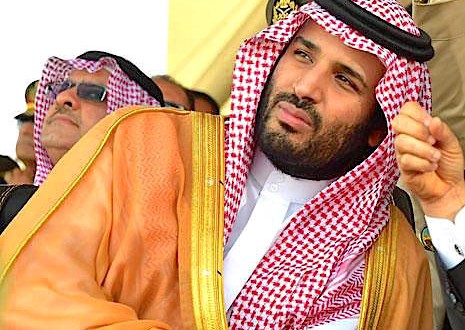Describing Saudi Arabia’s Defense Minister, Mohammad Bin Salman, as ‘the most dangerous man in the world” The UK’s Independent Newspaper published an article on Saturday saying the Prince was aggressive and ambitious.
Describing Saudi Arabia’s Defense Minister, Mohammad Bin Salman, as ‘the most dangerous man in the world” The UK’s Independent Newspaper published an article on Saturday saying the Prince was aggressive and ambitious. Author Bill Law began his article with a biography on the Prince who was only 12 when he began attending his father’s meetings (the then governor of Saudi Arabia’s Riyadh Province) and trading in shares and property. But he criticized him for plunging the country ‘into a brutal war in Yemen with no end in sight,’ describing him as power-lover.
Author Bill Law began his article with a biography on the Prince who was only 12 when he began attending his father’s meetings (the then governor of Saudi Arabia’s Riyadh Province) and trading in shares and property. But he criticized him for plunging the country ‘into a brutal war in Yemen with no end in sight,’ describing him as power-lover.
“Now the kingdom of Saudi Arabia is jousting dangerously with its regional foe Iran, led by a man seemingly in a big hurry to become the Middle East’s most powerful leader,” the writer said.
“Every step of the way, Prince Mohammed has been with his father, who took his favored son with him as he rose in the hierarchy of the House of Saud. Within the Saudi religious and business elite it was well understood that if you wanted to see the father you had to go through the son,” Bill Law wrote.
“Critics claim he has amassed a vast fortune, but it is power, not money, that drives the prince. When Salman ascended the Saudi throne in January 2015, he was already ailing and relying heavily on his son. Aged 79, the King is reported to be suffering from dementia and able to concentrate for only a few hours in a day. As his father’s gatekeeper, Bin Salman is the real power in the kingdom,” according to the Independent.
The newspaper points out that power was dramatically increased in the first few months of Salman’s rule. “Prince Mohammed was appointed Defence Minister; put in charge of Aramco, the national energy company; made the head of a powerful new body, the Council for Economic and Development Affairs with oversight over every ministry; and put in charge of the kingdom’s public investment fund. He was named deputy Crown Prince but ensured ascendancy over his rival Mohammed bin Nayef, the Crown Prince and Interior Minister, by absorbing the latter’s royal court into that of the King’s.”
The author, Bill Law, mocked Bin Salman’s zeal which led Saudi Arabia into a messy war in neighboring Yemen. “Decades of Saudi caution were thrown to the wind as Bin Salman presided over Operation Decisive Storm. It must have seemed a very good idea at the time: the young, ambitious son of an aged king leading a war against a rebellion in a troubled southern neighbour. That the rebellion was supported by Iran made the adventure even more attractive. The Saudi military was bristling with new weapons – billions of dollars’ worth. Bin Salman had a powerful older rival in the Interior Minister and wanted to prove his mettle both to his rival and his own supporters. The plan was to win a quick, decisive victory to confirm his stature as a military leader, placing him in the same league as his grandfather Ibn Saud, the great warrior king and founder of modern Saudi Arabia.”
The paper said Bin Salman ignored the fact that the ‘Houthis’ were a useful buffer against the real threat to the House of Saud, Al-Qaeda in the Arabian Peninsula (AQAP). “He seemed, too, to have overlooked that the tenacious Houthis had embarrassed the Saudis in a border war just a few years previously. That was in 2009, when they seized the Saudi Red Sea port of Jizan and left only after a substantial payment of some $70m (£48m).”
“Thus far Operation Decisive Storm has proved anything but. The war has dragged on for close to a year, causing infinite misery to the people of Yemen. In intense aerial bombardments, much of the country’s infrastructure has been destroyed while the Houthis remain defiantly in control of the capital Sanaa and most of the north. In the south, AQAP has had an open field. Undeterred, MbS has vowed to carry on, determined to bomb the Houthis to the negotiating table,” the paper pointed out.
The writer said enemies within the ruling family decried the arrogance of the young prince, even going so far as to call for his ousting along with his father and Mohammed bin Nayef. “But those calls have led nowhere… The question remains, though, how far his impetuous nature will take him in the conflict with Iran.”
The article concluded that it was not outside the realm of possibility that this “brilliant, brash young man casting himself in his grandfather’s mould as a Sunni warrior may be weighing up the options,” may be thinking of a military strike against Iran, saying the idea was “frightening” in a region already riven by sectarian war.